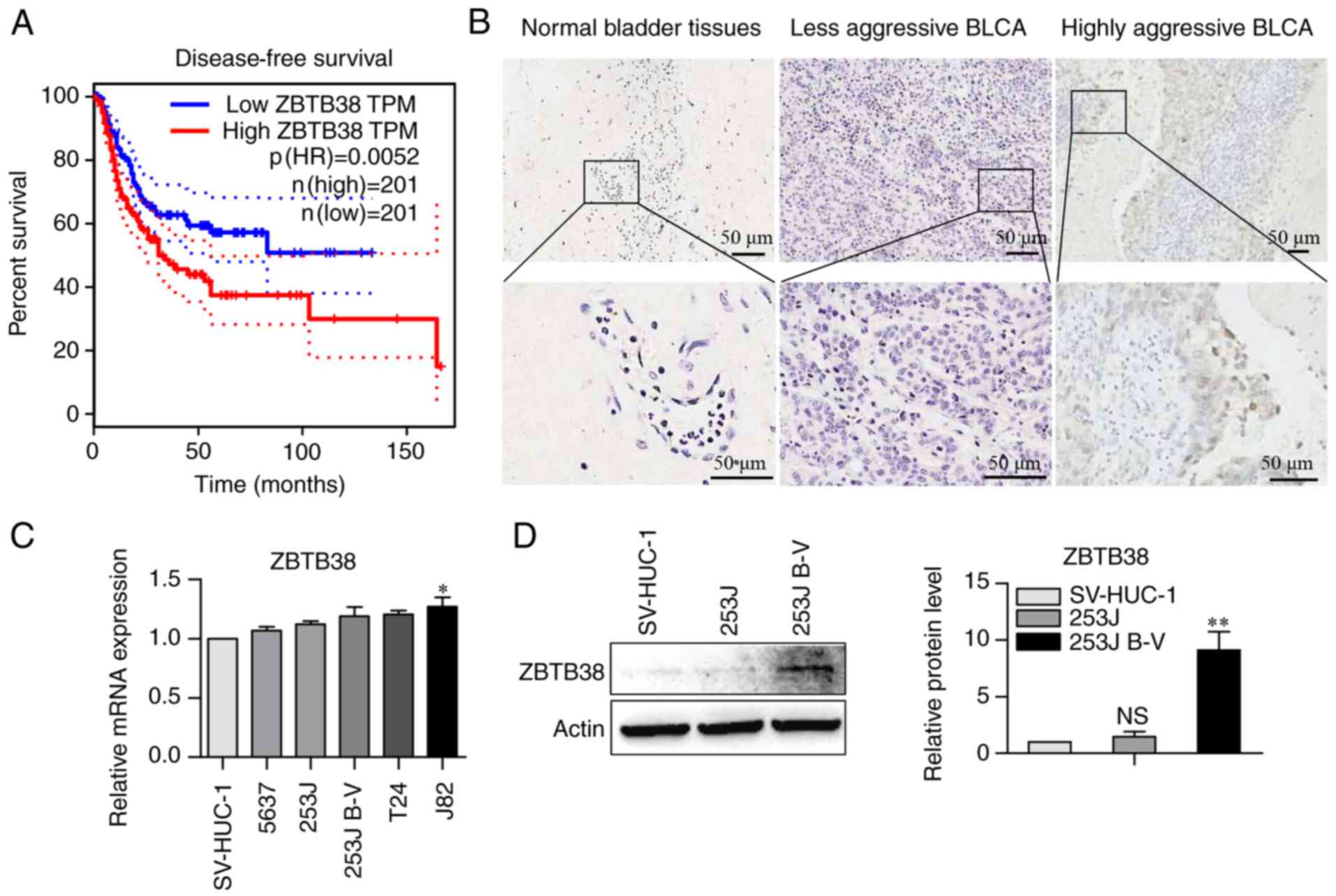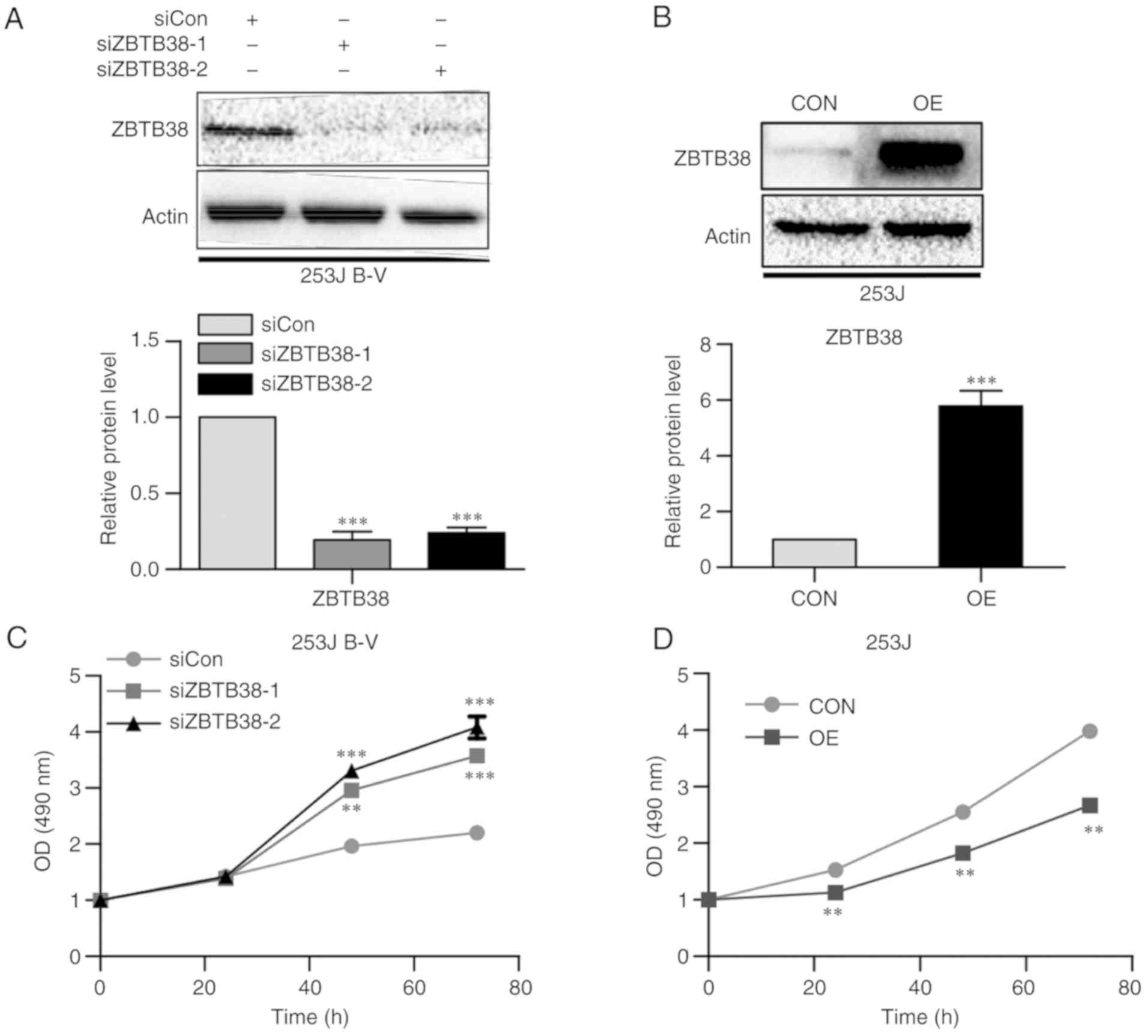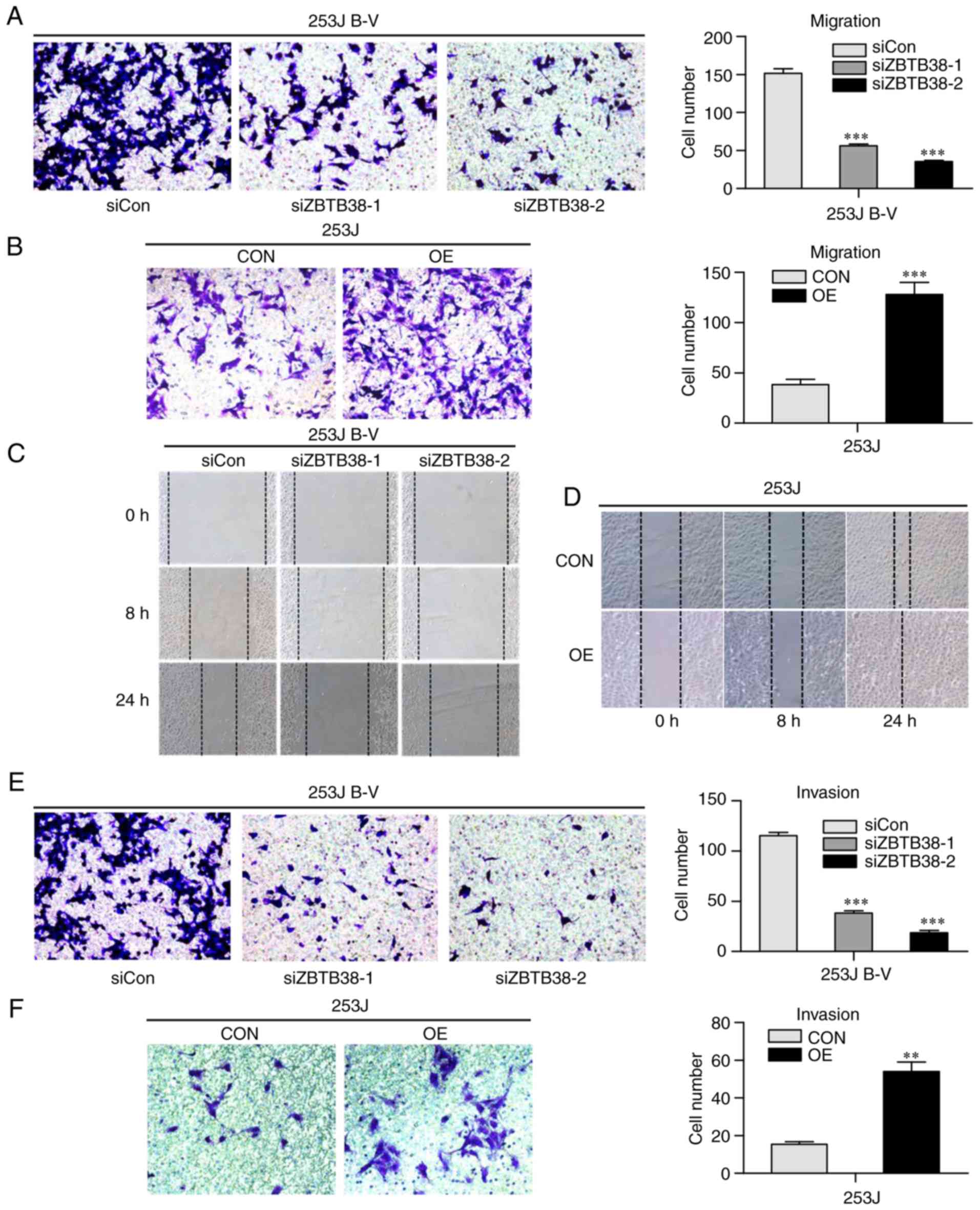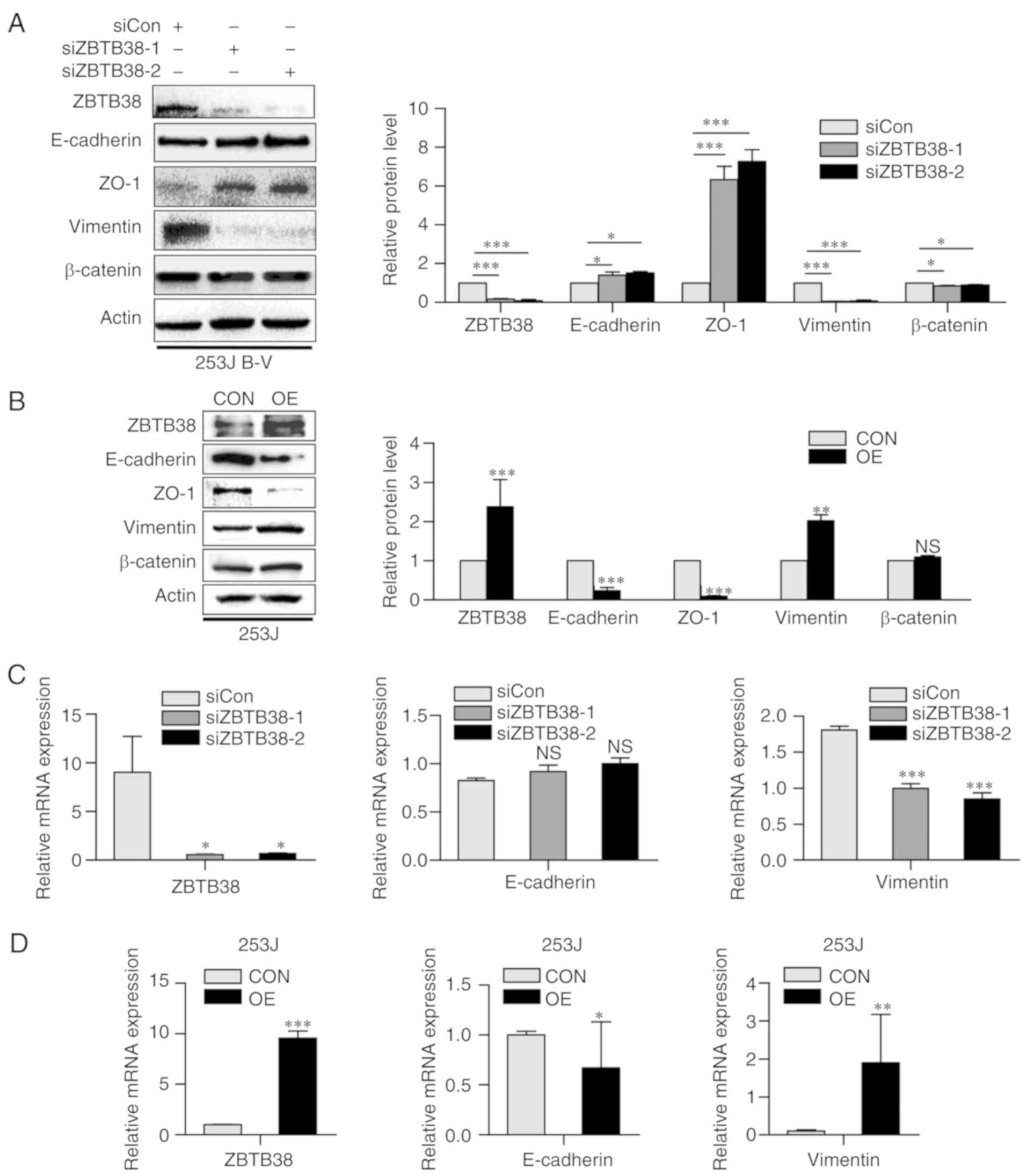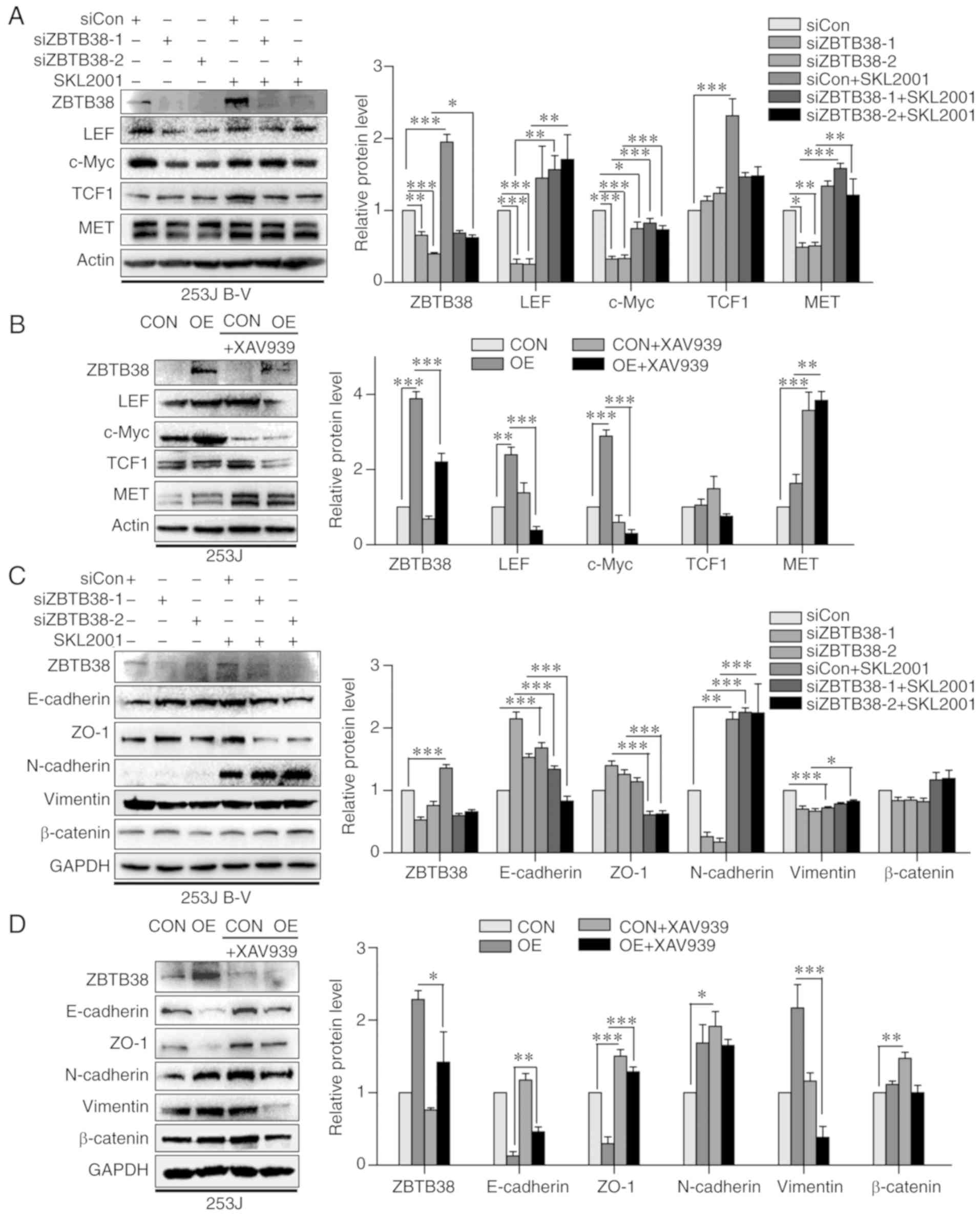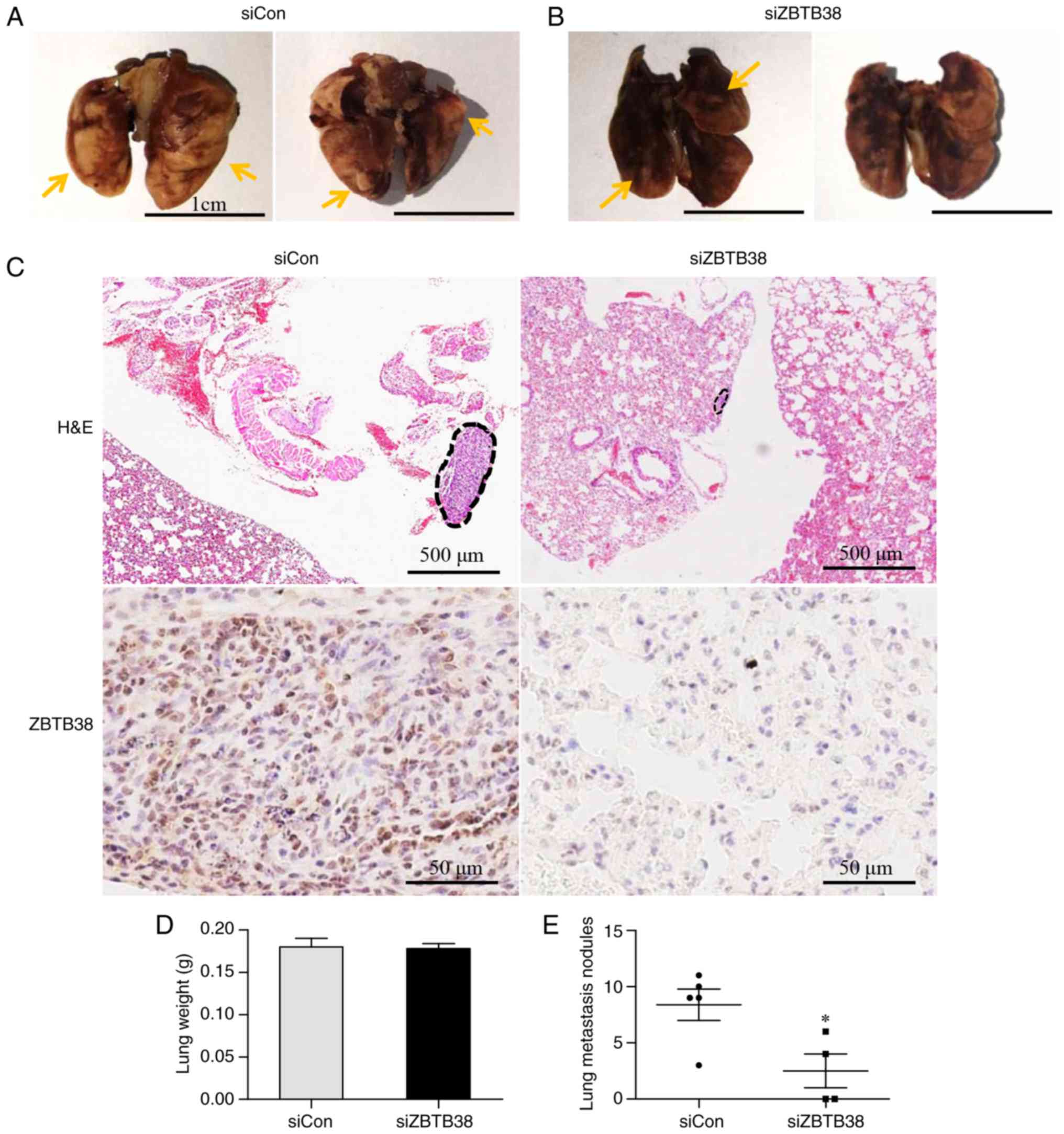|
1
|
Siegel RL, Miller KD and Jemal A: Cancer
Statistics, 2017. CA Cancer J Clin. 67:7–30. 2017. View Article : Google Scholar : PubMed/NCBI
|
|
2
|
Massari F, Santoni M, di Nunno V, Cheng L,
Lopez-Beltran A, Cimadamore A, Gasparrini S, Scarpelli M, Battelli
N and Montironi R: Adjuvant and neoadjuvant approaches for
urothelial cancer: Updated indications and controversies. Cancer
Treat Rev. 68:80–85. 2018. View Article : Google Scholar : PubMed/NCBI
|
|
3
|
Mertens LS, Neuzillet Y, Horenblas S and
van Rhijn BW: Landmarks in non-muscle-invasive bladder cancer. Nat
Rev Urol. 11:476–480. 2014. View Article : Google Scholar : PubMed/NCBI
|
|
4
|
van Rhijn BW, Vis AN, van der Kwast TH,
Kirkels WJ, Radvanyi F, Ooms EC, Chopin DK, Boevé ER, Jöbsis AC and
Zwarthoff EC: Molecular grading of urothelial cell carcinoma with
fibroblast growth factor receptor 3 and MIB-1 is superior to
pathologic grade for the prediction of clinical outcome. J Clin
Oncol. 21:1912–1921. 2003. View Article : Google Scholar : PubMed/NCBI
|
|
5
|
Zhang X and Zhang Y: Bladder cancer and
genetic mutations. Cell Biochem Biophys. 73:65–69. 2015. View Article : Google Scholar : PubMed/NCBI
|
|
6
|
Knowles MA and Hurst CD: Molecular biology
of bladder cancer: New insights into pathogenesis and clinical
diversity. Nature Rev Cancer. 15:25–41. 2015. View Article : Google Scholar
|
|
7
|
Knowles MA: Molecular subtypes of bladder
cancer: Jekyll and Hyde or chalk and cheese? Carcinogenesis.
27:361–373. 2006. View Article : Google Scholar : PubMed/NCBI
|
|
8
|
Mukherjee N, Houston TJ, Cardenas E and
Ghosh R: To be an ally or an adversary in bladder cancer: The
NF-kappaB story has not unfolded. Carcinogenesis. 36:299–306. 2015.
View Article : Google Scholar : PubMed/NCBI
|
|
9
|
Kim J, Akbani R, Creighton CJ, Lerner SP,
Weinstein JN, Getz G and Kwiatkowski DJ: Invasive bladder cancer:
Genomic insights and therapeutic promise. Clin Cancer Res.
21:4514–4524. 2015. View Article : Google Scholar : PubMed/NCBI
|
|
10
|
Houede N and Pourquier P: Targeting the
genetic alterations of the PI3K-AKT-mTOR pathway: Its potential use
in the treatment of bladder cancers. Pharmacol Ther. 145:1–18.
2015. View Article : Google Scholar : PubMed/NCBI
|
|
11
|
Filion GJ, Zhenilo S, Salozhin S, Yamada
D, Prokhortchouk E and Defossez PA: A family of human zinc finger
proteins that bind methylated DNA and repress transcription. Mol
Cell Biol. 26:169–181. 2006. View Article : Google Scholar : PubMed/NCBI
|
|
12
|
Kiefer H, Chatail-Hermitte F, Ravassard P,
Bayard E, Brunet I and Mallet J: ZENON, a novel POZ Kruppel-like
DNA binding protein associated with differentiation and/or survival
of late postmitotic neurons. Mol Cell Biol. 25:1713–1729. 2005.
View Article : Google Scholar : PubMed/NCBI
|
|
13
|
Miotto B, Chibi M, Xie P, Koundrioukoff S,
Moolman-Smook H, Pugh D, Debatisse M, He F, Zhang L and Defossez
PA: The RBBP6/ZBTB38/MCM10 axis regulates DNA replication and
common fragile site stability. Cell Rep. 7:575–587. 2014.
View Article : Google Scholar : PubMed/NCBI
|
|
14
|
Kote-Jarai Z, Olama AA, Giles GG, Severi
G, Schleutker J, Weischer M, Campa D, Riboli E, Key T, Gronberg H,
et al: Seven prostate cancer susceptibility loci identified by a
multi-stage genome-wide association study. Nat Genet. 43:785–791.
2011. View
Article : Google Scholar : PubMed/NCBI
|
|
15
|
Miotto B, Marchal C, Adelmant Guinot N,
Xie P, Marto JA, Zhang L and Defossez PA: Stabilization of the
methyl-CpG binding protein ZBTB38 by the deubiquitinase USP9X
limits the occurrence and toxicity of oxidative stress in human
cells. Nucleic Acids Res. 46:4392–4404. 2018. View Article : Google Scholar : PubMed/NCBI
|
|
16
|
Sun Z, Cao Y, Hu G, Zhao J, Chen M, Wang
S, Ye Z, Chen H, Wang W and Wang Y: Jinfu'an decoction inhibits
invasion and metastasis in human lung cancer cells (H1650) via
p120ctn-mediated induction and Kaiso. Med Sci Monit. 24:2878–2886.
2018. View Article : Google Scholar : PubMed/NCBI
|
|
17
|
Jones J, Wang H, Zhou J, Hardy S, Turner
T, Austin D, He Q, Wells A, Grizzle WE and Yates C: Nuclear Kaiso
indicates aggressive prostate cancers and promotes migration and
invasiveness of prostate cancer cells. Am J Pathol. 181:1836–1846.
2012. View Article : Google Scholar : PubMed/NCBI
|
|
18
|
Kourtidis A, Lu R, Pence LJ and
Anastasiadis PZ: A central role for cadherin signaling in cancer.
Exp cell Res. 358:78–85. 2017. View Article : Google Scholar : PubMed/NCBI
|
|
19
|
Kourtidis A, Ngok SP and Anastasiadis PZ:
P120 catenin: An essential regulator of cadherin stability,
adhesion-induced signaling, and cancer progression. Prog Mol Biol
Transl Sci. 116:409–432. 2013. View Article : Google Scholar : PubMed/NCBI
|
|
20
|
Iioka H, Doerner SK and Tamai K: Kaiso is
a bimodal modulator for Wnt/beta-catenin signaling. FEBS Lett.
583:627–632. 2009. View Article : Google Scholar : PubMed/NCBI
|
|
21
|
Clevers H: Wnt/beta-catenin signaling in
development and disease. Cell. 127:469–480. 2006. View Article : Google Scholar : PubMed/NCBI
|
|
22
|
Logan CY and Nusse R: The Wnt signaling
pathway in development and disease. Annu Rev Cell Dev Biol.
20:781–810. 2004. View Article : Google Scholar : PubMed/NCBI
|
|
23
|
Pierzynski JA, Hildebrandt MA, Kamat AM,
Lin J, Ye Y, Dinney CP and Wu X: Genetic variants in the
Wnt/beta-catenin signaling pathway as indicators of bladder cancer
risk. J Urol. 194:1771–1776. 2015. View Article : Google Scholar : PubMed/NCBI
|
|
24
|
Colin P, Fishbeck R, Singh RK, Eve B,
Pathak S, Brown N, Xie B, Fan D, Bucana CD and Fidler IJ: Isolation
and characterization of metastatic variants from human transitional
cell carcinoma passaged by orthotopic implantation in athymic nude
mice. J Urol. 154:1532–1538. 1995. View Article : Google Scholar : PubMed/NCBI
|
|
25
|
Livak KJ and Schmittgen TD: Analysis of
relative gene expression data using real-time quantitative PCR and
the 2ΔΔCT method. Methods. 25:402–408. 2001.
View Article : Google Scholar : PubMed/NCBI
|
|
26
|
Wallace J: Humane endpoints and cancer
research. ILAR J. 41:87–93. 2000. View Article : Google Scholar : PubMed/NCBI
|
|
27
|
Tang Z, Li C, Kang B, Gao G, Li C and
Zhang Z: GEPIA: A web server for cancer and normal gene expression
profiling and interactive analyses. Nucleic Acids Res. 45:W98–W102.
2017. View Article : Google Scholar : PubMed/NCBI
|
|
28
|
Thiery JP and Sleeman JP: Complex networks
orchestrate epithelial-mesenchymal transitions. Nat Rev Mol Cell
Biol. 7:131–142. 2006. View Article : Google Scholar : PubMed/NCBI
|
|
29
|
Gilles C, Polette M, Mestdagt M,
Nawrocki-Raby B, Ruggeri P, Birembaut P and Foidart JM:
Transactivation of vimentin by beta-catenin in human breast cancer
cells. Cancer Res. 63:2658–2664. 2003.PubMed/NCBI
|
|
30
|
Kwiecien JM, Bassey-Archibong BI,
Dabrowski W, Rayner LG, Lucas AR and Daniel JM: Loss of Kaiso
expression in breast cancer cells prevents intra-vascular invasion
in the lung and secondary metastasis. PLoS One. 12:e01838832017.
View Article : Google Scholar : PubMed/NCBI
|
|
31
|
Bassey-Archibong BI, Kwiecien JM,
Milosavljevic SB, Hallett RM, Rayner LG, Erb MJ, Crawford-Brown CJ,
Stephenson KB, Bédard PA, Hassell JA, et al: Kaiso depletion
attenuates transforming growth factor-beta signaling and metastatic
activity of triple-negative breast cancer cells. Oncogenesis.
5:e2082016. View Article : Google Scholar : PubMed/NCBI
|
|
32
|
Wang H, Liu W, Black S, Turner O, Daniel
JM, Dean-Colomb W, He QP, Davis M and Yates C: Kaiso, a
transcriptional repressor, promotes cell migration and invasion of
prostate cancer cells through regulation of miR-31 expression.
Oncotarget. 7:5677–5689. 2016.PubMed/NCBI
|
|
33
|
Takebe N, Miele L, Harris PJ, Jeong W,
Bando H, Kahn M, Yang SX and Ivy SP: Targeting Notch, Hedgehog, and
Wnt pathways in cancer stem cells: Clinical update. Nat Rev Clin
Oncol. 12:445–464. 2015. View Article : Google Scholar : PubMed/NCBI
|
|
34
|
Xi Y and Chen Y: Wnt signaling pathway:
Implications for therapy in lung cancer and bone metastasis. Cancer
Lett. 353:8–16. 2014. View Article : Google Scholar : PubMed/NCBI
|
|
35
|
Anastas JN and Moon RT: WNT signalling
pathways as therapeutic targets in cancer. Nat Rev Cancer.
13:11–26. 2013. View Article : Google Scholar : PubMed/NCBI
|
|
36
|
Prokhortchouk A, Sansom O, Selfridge J,
Caballero IM, Salozhin S, Aithozhina D, Cerchietti L, Meng FG,
Augenlicht LH, Mariadason JM, et al: Kaiso-deficient mice show
resistance to intestinal cancer. Mol Cell Biol. 26:199–208. 2006.
View Article : Google Scholar : PubMed/NCBI
|















